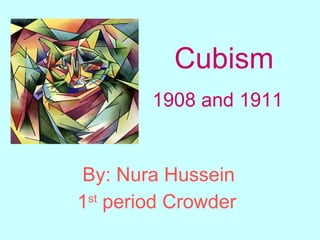
Cubism 1908-1918: Analytic, Synthetic and the End of an Art Movement
- 1. By: Nura Hussein 1 st period Crowder Cubism 1908 and 1911
- 2. 1908 cubism begins. 1908 – 1912 Analytical cubism begins. 1881 Pablo Picasso was born. 1882 George Braque was born. 1839 Paul Cézanne was born
- 3. 1918 cubism ended. 1980 Facet cubism begins. 1912 – 1919 synthetic cubism begins.
- 5. Cubism is a nonobjective school of painting and sculpture developed in Paris in the early 20th century, characterized by the reduction and breakup of natural forms into abstract, often geometric structures usually rendered as a set of discrete planes. Cubism was an art movement that revolutionized European painting and sculpture, and inspired related movements in music and literature. Analytic cubism and Synthetic cubism are two forms of cubism. What is Cubism
- 10. Pablo Picasso Pablo Picasso was born on October 25, 1881 in Malaga, Spain, as the son of an art and drawing teacher. He was a brilliant student. He passed the entrance examination for the Barcelona School of Fine Arts at the age of 14 in just one day and was allowed to skip the first two classes.
- 12. Georges Braque Georges Braque developed his painting skills while working for his father, a house decorator. He moved to Paris in 1900 to study where he was drawn to the work of the Fauve artists, including Matisse, Derain and Dufy, as well as the late landscapes of Cézanne. Meeting Picasso marked a huge turning point in Braque's development and together they evolved as leaders of Cubism.